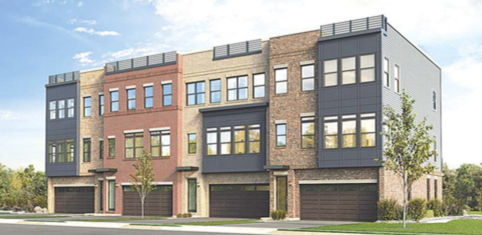
Photo courtesy Toll Brothers
By Philip Sean Curran
MIDDLETOWN – National home builder Toll Brothers gained approval from Middletown Township last week to construct 280 town houses and 70 apartments as the residential component of a larger redevelopment of more than 100 acres on Route 35 north.
In combination with a 342,000-square-foot commercial project that includes a new Wegmans supermarket, that section of town will be transformed in the coming years, fulfilling a two-decades-long vision for the area. The municipal planning board voted Sept. 4 to approve Toll Brothers’ plan, having voted in July for the commercial piece that also includes a CMX movie theater and retail space as part of the overall Village 35 project.
“This is a long-time-coming project,” Middletown Mayor Tony Perry said. “Township committees of the past have worked to dramatically reduce the overall size and scope of this project by more than 400 percent.”
He said the area once was eyed for 1.6 million square feet of commercial space and almost double the number of residential units that ended up getting approved.
The planning board voted 5-3 to give Toll Brothers the approval but without roof decks on any of the buildings. Toward the end of the hearing, township committeewoman Patricia A. Snell, who also sits on the planning board, made a motion to that effect.
Toll Brothers did not indicate whether it intended to appeal the board’s vote or not. Company spokeswoman Andrea Meck said the company is reviewing its next steps.
“Despite our plans for Middletown Walk not being approved as presented, Toll Brothers has a long history of working within town approvals, addressing neighbors’ concerns and delivering exceptional homes in the best communities,” said Toll Brothers division president Craig Cherry in a statement. “We are very excited about Middletown Walk, located in a town that we love, and we know our future home buyers will be very pleased with the homes and amenities planned.”
In 2018, the governing body approved a redevelopment plan for the overall site, a plan that critics said lacked public involvement.
“It has every kind of rule and regulation about all kinds of different things they’re allowed to do, but this wasn’t discussed with the public,” said resident Monica Manning, the leader of Minding Middletown, a group opposed to the project. “This was the deal they made behind closed doors, then presented it.”
The 70 apartments will be set aside as affordable housing or at below-market rate.
“My two cents is that it seems to me that a lot of this was done for affordable housing,” said Oley DiCenso, with Minding Middletown, after the planning board hearing. “And the affordable housing aspect of this is only sitting on four acres.”
The timing of the Toll Brothers’ approval came two months after the township announced it was withdrawing from a legal proceeding in state Superior Court regarding its affordable housing requirement.
In 2015, the New Jersey Supreme Court shifted the responsibility of enforcing towns’ affordable housing mandates, as outlined in the high court’s earlier Mount Laurel decisions in the 1970s and ’80s, from the state Council on Affordable Housing to superior court judges.

Photo courtesy Toll Brothers
As other communities have done, the township had been in talks with the advocacy group Fair Share Housing Center to try and reach a settlement for what Middletown’s requirement would be for a span from 1999 to 2025.
The decision by the township has led to a war of words between Fair Share and Middletown, a conflict that continued last week.
Perry said his community would no longer be “dictated to by a nonprofit organization that is funded by special interest groups who are going to dictate terms to municipalities.”
“There are 565 municipalities in the state of New Jersey. One of them is standing up to Fair Share Housing and that’s Middletown, New Jersey,” Perry said. “It sounds like a great idea, let’s create affordable housing, let’s give people the opportunity to live in different towns. And that sounds great. But you know what I want, you know what I stand for? I stand for making New Jersey affordable. I stand for making Middletown affordable, not just for this person or that person but for everyone.”
Yet Fair Share said last week that the township “is one of the worst actors in the state when it comes to affordable housing.”
Fair Share spokesman Anthony Campisi said in a recent interview that the township has a track record of approving luxury housing units that do not include affordable units, including at the former Bamm Hollow Country Club in Lincroft.
“They have no problems seemingly building homes that are affordable to doctors and lawyers, but have a whole lot of trouble building homes that are affordable for nurses and paralegals and cashiers and teachers for that matter,” he said. “They have no problem redeveloping big chunks of land for wealthy people. The problem comes when working families want a seat at the table.”
The township has said that since 1999, more than 600 affordable housing units have been created in the community.
Yet affordable housing in the Village 35 project and elsewhere around the state also has involved the construction of many more market-rate houses to go along with it as part of high density, inclusionary developments. For instance, West Windsor, located about an hour away from Middletown, reached a deal with national builder AvalonBay for 800 units, a hotel and retail space on land next to a train station in that Mercer County community. Of the 800 units, 132 of them will be set aside as affordable.
Assemblywoman Serena DiMaso (R-13), who represents Middletown as part of her legislative district, said she applauded the township for “pushing back.”
“Maybe it takes a ground-swell from towns banding together to stop this affordable housing mandate,” she said. “I mean I think the whole system just needs an overhaul. It has to be fixed. We can’t have this the way it’s going now. We will not be the Garden State for very much longer if we continue down this path.”
But Campisi said communities have “many” ways of meeting their affordable housing obligations, with inclusionary developments being just one of them. He said towns can develop 100 percent affordable housing projects.














